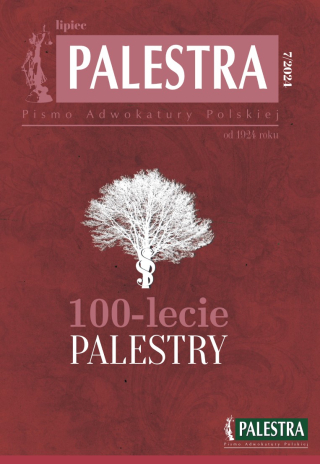
Palestra
07/2024
Szanowni Czytelnicy!
W siódmym numerze „Palestry” w jubileuszowym roku obchodów 100-lecia Pisma Adwokatury Polskiej dominują kwestie związane z pracą i wykonywaniem zawodu adwokata, a także wątki karnistyczne związane z aktualnymi problemami i wy- zwaniami w obszarze prawa karnego. W aktualnym numerze „Palestry” można prze- czytać artykuły: adw. Piotra Rachwała pt. Aksjologia roty ślubowania adwokackiego i pojęcie pracy adwokata, prof. dr. hab. Jana Widackiego oraz dr Anny Szuba-Boroń pt. Czy zmiana trybu ścigania przestępstwa zgwałcenia osiągnęła zamierzony skutek?, dr. hab. Szymona Tarapaty pt. Wybrane uwagi o standardach przypisywania sprawstwa przestępstw fakturowych związanych z działalnością zorganizowanej grupy przestępczej, dr Dominiki Bek - O (nie)dopuszczalności skierowania sprawy karnej do mediacji na etapie postępowania przygotowawczego w fazie in rem, adw. Małgorzaty Gemen pt. Odrzucenie spadku w imieniu małoletniego – aspekt transgraniczny a nowelizacja art. 101 kodeksu rodzinnego i opiekuńczego, adw. dr. Jarosława Marciniaka pt. Ochrona trwałości stosunku pracy osób odbywających czynną służbę wojskową, a także Michaliny Kruszyńskiej pt. Wykorzystanie prawniczych spółek kapitałowych jako innowacyjna forma wykonywania zawodu adwokata i radcy prawnego. Ponadto w numerze 7/2024 „Palestry” na Czytelników w dziale Szpalty pamięci czeka wspomnienie o adw. Jakubie Jacynie autorstwa adw. Wojciecha Bergiera.
Redaktor naczelny: Michał Bieniak; Sekretarz redakcji: Adam Kozień
Redaktor języka angielskiego: Anna Setkowicz
Członkowie Kolegium Redakcyjnego: Stanislav Balik, Zbigniew Banaszczyk, Jacek Barcik, Wojciech Bergier, Józef Forystek, Piotr Fiedorczyk, Lech Gardocki, Paweł Gieras, Roman Hauser, Joseph Hoffmann, Krzysztof Kostański, Andrzej Kubas, Jan Kuklewicz, Katalin Ligeti, Erik Luna, Frank Meyer, Kamila Mrozek, Dariusz Mucha, Marek Antoni Nowicki, Piotr Ochwat, Szymon Pawelec, Krzysztof Piesiewicz, Piotr Piesiewicz, Krzysztof Pietrzykowski, Jerzy Pisuliński, Paweł Podrecki, Janusz Raglewski, Anna Rakowska-Trela, Stanisław Rymar, Marek Safjan, Philippe Sands, Piotr Sendecki, Elżbieta Skowrońska, Tomasz Sójka, Monika Strus-Wołos, Maciej Szpunar, Dobrosława Szumiło-Kulczycka, Dariusz Świecki, Jaromir Tauchen, Stephen C. Thaman, Andrzej Tomaszek, Józef Wójcikiewicz, Maria Zabłocka, Stanisław Zabłocki, Jerzy Zajadło, Piotr Zientarski, Jerzy Zięba